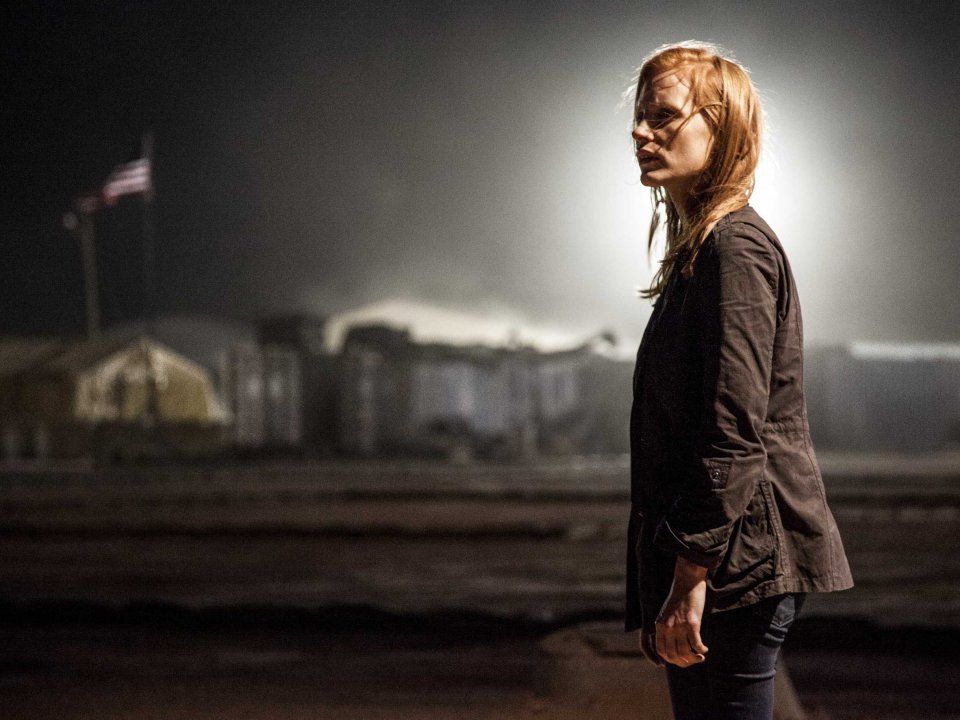The Contender plans to look at the nine Best Picture nominees, their likelihood of winning, and my overall impressions of them. Today we start with what I personally feel is the best film of 2012; Kathryn Bigelow’s Zero Dark Thirty.
It only feels like now the world is catching up to what I already knew; Kathryn Bigelow is a genius. Having something of a career rejuvenation with The Hurt Locker in 2009, Bigelow became the first woman to win the Best Director Academy Award. Regardless of what moronic writers might say about that victory, Bigelow rightly deserved it. True, Sensei (as I call her) Bigelow is easy on the eyes, but my admiration of her has to do with the body of work she’s accomplished through her career.
Zero Dark Thirty might be the cornerstone of that illustrious career. The best trait of Bigelow’s directing is her understanding of the material she takes on. With Point Break, she knew how to have fun without being overly campy. For Hurt Locker, she embelished reality to give us a character study of what war can do to you. In Zero Dark Thirty, Bigelow opts for a journalistic take on the ten year manhunt for Osama bin Laden.
In this sense, Bigelow and writer Mark Boal seem to channel David Simon’s beautiful television show “The Wire”, giving us enough information to satisfy our appetite, then quickly moving on to the next piece. Bigelow treats her audience like adults, expecting us to pay close attention to every detail. In lesser hands, Zero Dark Thirty could have easily been a flag waiving, circle jerk in the vein of Pearl Harbor. Instead it’s procedural, refusing to glorify torture or the eventual murder of Osama bin Laden, handled by a master of the medium.
Boal’s script wisely chooses to keep Jessica Chastain’s Maya at the center of all of this. She’s our eyes into everything, with Chastain playing her like a machine. Her evolution through the film is subtle, but just as effective to watch as she goes from bright, young CIA agent to a cold and calculating head of operations. Chastain gets all these subtleties, and nails them right out of the park. Sometimes it’s what you don’t reveal more than what you do, and Chastain’s performance is exactly that.
It’s still Bigelow’s masterful directing that takes center stage though, keeping us on edge for the full two hours and thirty minutes. The raid on bin Laden’s compound isn’t gratuitous, and perfectly crafted. Bigelow uses longshots to establish where we are, then uses POV shots (a trademark of hers) decorated with night vision to get us in the action. The film builds up to this moment, and again, Sensei Bigelow doesn’t make it a glorious moment. It’s just something that happens, and the scene is that much more tense and rewarding.
Zero Dark Thirty is the equivalent to Michelangelo’s painting in the Sistine Chapel. This is a queen of cinema making her finest piece of work, and arguably the most important American film since There Will Be Blood. Where Paul Thomas Anderson’s opus showed us what American business can consume and destroy oneself, Bigelow captures a time in American history when right and wrong was questioned, and any means necessary was the only method when a country is pushed. While there’s no question Bigelow will continue to make amazing pictures, it’s tough to imagine she’ll eclipse Zero Dark Thirty.
Unfortunately, the controversy surrounding the film has all but hurt its chances of taking home the big prize come Oscar night. Known for playing it safe, The Academy rarely, if ever, chooses a film with a dark cloud over it, and that’s precisely what Zero Dark Thirty has. It calls back to a time in 1942 when William Randolph Hearst violently campaigned against Citizen Kane, and The Academy played it safe with John Ford’s How Green Was My Valley.
In due time, Zero Dark Thirty will be appreciated by film scholars for the masterwork it is. It just won’t be February 24th, 2013.

